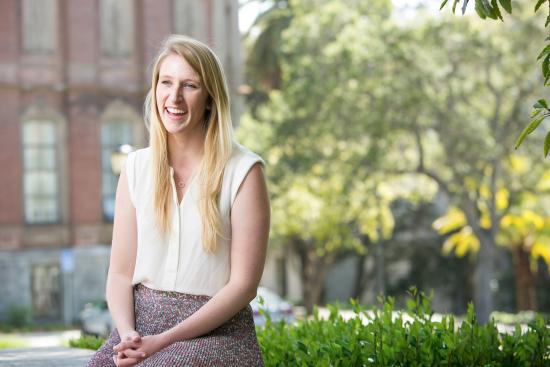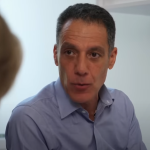Shannon Hamilton graduated from the School of Information with a Master’s in Information Management and Systems in 2018. Prior to the I School, Shannon completed a Bachelor of Arts in Public Health at UC Berkeley in 2012. She currently works as Director of Product, Analytics & Reporting at Brightline. Her interests lie at the intersection of public health and data science in order to improve the healthcare system here in the US.
Why did you choose the I School?
The strong alumni network of the I School strikes again! After college I worked at Gobee Group, a social innovation design firm co-founded by Mahad Ibrahim, a Ph.D. graduate of the I School. We worked on technology problems across all areas of public health and healthcare — everywhere from local public health departments and nonprofits, to large pharmaceutical companies and foundations like the Clinton Health Access Initiative and BIll and Melinda Gates foundation. Inspired by Mahad’s view of the world and the way he approached technology-problems as really people-problems in disguise, I too decided to throw my hat in the ring for MIMS. I’m so glad I did. The program allowed me to grow a new data science skill set and a new way of thinking that I’m confident will help me as I continue work in the public health and healthcare space.
What was your focus while at the I School?
Because of my Public Health background, I’ve sought out opportunities while at the I School that would allow me to mix health and data and understand more about data’s power to redefine healthcare here in the US.
What was the advantage of being at the I School for you?
My fellow students. Hands down. My peers at the I School are the brightest, most curious technological minds, stemming from all corners of the world, and incredibly, the most humble and supportive group of individuals I’ve ever had the opportunity to work with and learn from. I learned to code, to build models, to write law memos, to lead teams, to make business models and pitch decks because I had a network of peers that were always there to respond to late-night Slack messages, do teach-in demos in the Lounge, and in the end, always willing to hunker down and figure it out together. I owe my success at the I School entirely to my fellow classmates. We’re a nerdy, wonderful bunch and I’m so grateful.
What was your favorite class?
Josh Blumenstock’s class, “Applied Machine Learning” and Deirdre Mulligan’s “Information Law & Policy”. Josh has an incredible way of breaking down advanced machine learning concepts in such a relatable, supportive way. He starts at the very beginning and carries to you to the most advanced ML research to date. I feel lucky to have taken his class. Deirdre’s class made me think differently about technology, and I think those classes are the most influential and powerful. Her class is the epitome of all that the I School stands for.
 What is an information challenge that intrigues you?
What is an information challenge that intrigues you?
In healthcare, there is a lot of talk about making sense of and utilizing big data. It’s a great thought — lots of relevant healthcare data is available, in fact, today an average hospital in the US is generating roughly 665 terabytes of data annually — but currently, it’s so not easy to do. The data is not interoperable and its really, really messy, with lots of unstructured data in doctor’s notes, images and video. Put another way, there are tons of potentially useful data to examine, but we don’t have accessible ways currently for people to actually use that data. Access is difficult, formats are inconsistent, data is incomplete or too narrow in scope, or really, the data doesn’t address the question the end user wants. I’m very interested in creating products or interfaces that allow and enable the experts — doctors, nurses — to dive in and make sense of all this data and also capitalize on their own years of training and expertise. Innovators in this space need to align economic incentives in order to truly enhance healthcare and save lives. Otherwise, all of our growing big data stores will simply be even bigger, unused blobs on ever-bigger data servers.
Do you have any advice for aspiring information professionals?
Lots! All of which has been passed down to me by wise individuals a few steps ahead.
-
Get out and meet with those that inspire you, face to face: Set goals for yourself and try to meet one new person that inspires you every week, every month or every quarter. Take them out for a beer, thank them, help them however you can and keep in touch. Your network is your greatest asset.
-
Everyone was a beginner once — you can do this: Learning technical skills can be hard if you don’t know where to start. Find avenues of support that work best for you, your learning style and your schedule. You can do this. When I was learning, I remember feeling like I had all these puzzles pieces being thrown at me but not knowing how to piece them together. That will come in time! Stick with it and get over that first hump. Coding is a way of thinking, but, really is as much about knowing how and what to Google. :)
-
Everyone feels “imposters syndrome”, that discomfort can often mean you’re in a great position for growth: In these moments, be humble, listen to those around you, acknowledge your weaknesses and capitalize on your strengths.
-
Question your assumptions and biases: We all hold hidden biases. Have an ongoing conversation with yourself in understanding how your own multiple identities (for example, your race, gender, class, and sexual orientation) fit into the broader work towards progress in our industry.









